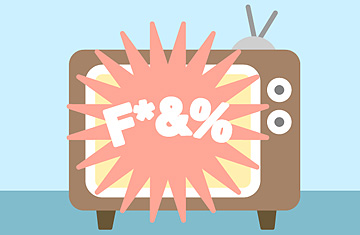
When John Douglas tuned in to New York City radio station WBAI on October 30, 1973, he heard these words: s--t, p--s, f--k, c--t, c--------r, mother-----r and t--s. One after the other.
"I hadn't heard those words since I was a kid in the steel factories in Canton, Ohio," says Douglas, now 80. "And my son is next to me giving me a quizzical look."
Back then, Douglas was president of the publishing and education division of CBS. But he was also a member of Morality in Media, a non-profit organization established to keep the public airwaves squeaky clean, and one that was often at loggerheads with networks like CBS.
And that afternoon, when he heard comedian George Carlin's "Seven Dirty Words" rant filtering through his car radio, it enraged him enough that he filed a complaint to the Federal Communications Commission.
Today — almost 40 years later — he seems just as incensed by it all.
"Do you want to live in this kind of society?" says Douglas. "Do you want to live where somebody will defecate on the sidewalk and say that that's a function of his personal freedom?"
Douglas's lone action against the airing of Carlin's now-famous anti-censorship routine led to five years of litigation that culminated in a 1978 Supreme Court decision — FCC vs. WBAI's owners, the non-profit Pacifica Foundation — that sided with Douglas and Morality in Media and upheld the FCC's right to regulate content that's broadcast over television and radio airwaves.
It was a victory for those who believed that broadcast content should not only be a safe place for families, but that airwaves were a unique medium because they're owned and licensed out by the government — and therefore within government jurisdiction.
But today's media landscape looks like it's from a different civilization compared to 1970s TV and radio. Much of our radio consumption comes in the form of podcasts or is streamed online. Most Americans now get their television shows via cable providers rather than over the airwaves. Meanwhile, the four national networks have been engulfed by hundreds of specialized cable channels, many with racy themes and explicit content. The boundary-pushing cable atmosphere has also slowly leaked into broadcast programming — bringing with it a tolerance for language and plotlines that would have been unthinkable 40 years ago.
"Today there are fewer green-lit shows than at any point in time, perhaps in the history of television," says Tim Winter, President of the Parents Television Council, which rates virtually every show on television by giving it either a green, yellow or red light so parents know if it's safe for children. "We actually had a point this year for the first time ever where there was no original entertainment on primetime broadcast television that was rated green."
Primetime network shows like "Two and a Half Men," "Don't Trust the B---- in Apartment 23," "$#*! My Dad Says," and "Hell's Kitchen," often include overly suggestive sexual themes, pixelated nudity and countless incidents of bleeped profanity and would've never even been considered for something like ABC's sugar-coated TGIF lineup in the '90s with shows like Full House and Family Matters. Just briefly consider Full House's "bad boy" Jesse Katsopolis for a second.
Cable has seen a similar shift. For several years, Jersey Shore and all its trashy, profane explosiveness consistently garnered some of the highest ratings on cable for the 12-34 demographic. Even shows like The Sopranos and Sex and the City that were initially aired on premium channels such as HBO can now be found on basic cable, still with most of the sexual references and violence, but merely with the curse words bleeped out.
